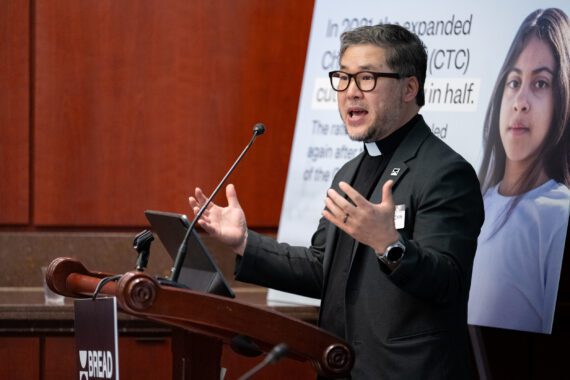Editor’s note: This is the first of a two-part series that explores how anti-hunger advocates can help promote gender pay equity as an essential element of ending hunger.
Hunger in the United States is primarily caused by economic inequality, which is a driver of poverty, and the lowest-paid American workers are far more likely to face food insecurity than those who are paid more.
Over the past few years, Bread for the World’s U.S. anti-hunger advocacy has included support for several policies that would help lower poverty among specific groups of workers. For example, Bread called for an end to the “tipped minimum wage,” which allows employers to pay workers such as restaurant servers as little as $2.13 an hour with the expectation that tips would bring the hourly wage up to the standard minimum wage. Under federal law, employers are responsible for making up the difference if tips alone do not, but workers report that this does not always happen.
Tipped workers are disproportionately women, especially women of color. Bread has also been working to promote racial and gender equity in the workplace. Restaurant servers and cashiers are among the lower-paid workers who would benefit from stricter enforcement of existing laws against pay discrimination on the basis of race or sex. But racial and gender inequities are very broad causes of poverty that affect millions of people around the country. These forms of inequities are tied to essentially permanent aspects of people’s identities, such as race, gender, and age, rather than to factors such as occupation or level of education that are easier to change.
Pay disparities based on race and/or gender are entrenched in the American economy. They are one of many visible signs of long-term societal ills such as racism and sexism. But this does not mean we have to accept that poverty, or the idea that racism and/or sexism, will inevitably be present. In fact, we cannot accept these things, because doing so means giving up on Bread’s mission of ending hunger in this country.
The changes needed to make lasting progress on pay disparities, let alone the deep-seated biases that cause the disparities, call for proactive leadership. Leaders can be almost anyone who is committed to finding ways of achieving part or all of the goal. Local community groups and organizations like Bread have been able to get proven policy improvements enacted into law.
Landmark legislation often requires an “all hands on deck” approach, with members of Congress, the administration, and the courts working to get something completely finished. One such critically important achievement was the Civil Rights Act of 1964.
Another was the Equal Pay Act of 1963. It was the first federal legislation that specifically prohibited pay discrimination based on gender—an important step along the path to gender equality that had also featured, not so long before, thousands of women mobilizing for decades to secure the right to vote.
Data for 1963 indicate that the Equal Pay Act was undoubtedly needed: women who worked full-time year-round were paid 59 cents for every dollar paid to men.
Nearly 60 years later, in 2022, women who worked full-time year-round were paid 84 cents for every $1 paid to men. The next part of this series will assess how significant the progress has been and consider next steps.
Michele Learner is managing editor, Policy and Research Institute, with Bread for the World.



